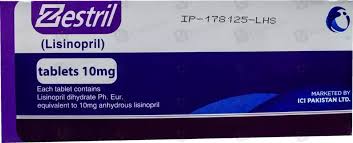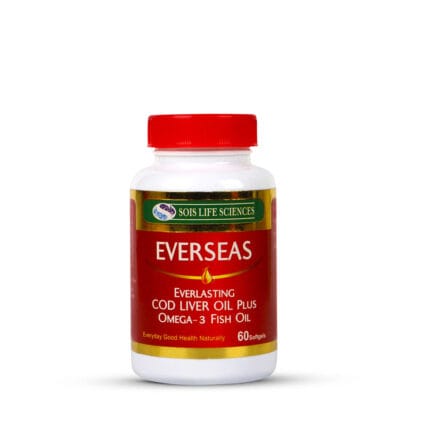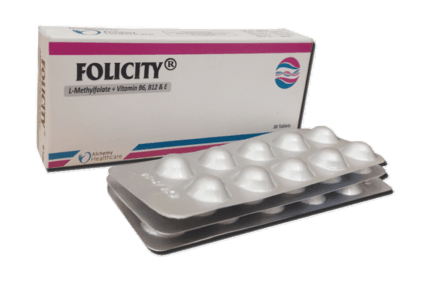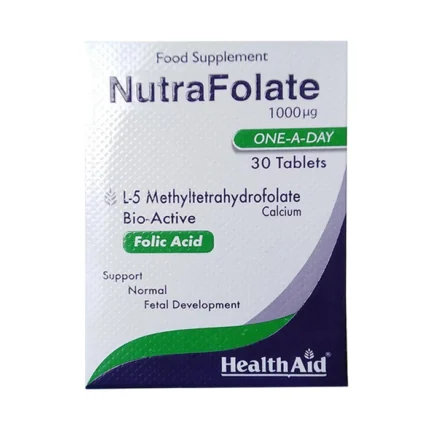Lisinopril is a drug that helps to relax the blood vessels and reduce blood pressure. This helps to reduce the workload on the heart, improve blood flow, and decrease the risk of heart attacks and stroke. It is used to treat hypertension (high blood pressure), congestive heart failure, and diabetic nephropathy (kidney damage due to diabetes). Lisinopril blocks the enzyme ACE, which is responsible for the formation of angiotensin II. Angiotensin II is a hormone that causes blood vessels to constrict or tighten, leading to increased blood pressure. By blocking this enzyme, lisinopril helps to lower blood pressure and improve kidney function in patients with diabetes by reducing damage due to hypertension. Lisinopril is typically prescribed as part of a comprehensive treatment plan that may include lifestyle modifications such as diet and exercise. It is important to follow the dosage instructions provided by a physician or pharmacist and to regularly monitor and adjust the medication as directed by a healthcare provider based on individual responses and blood pressure goals. It is important to note that lisinopril may cause dizziness or lightheadedness in some people, especially when starting treatment or when the dose is increased. This is why it is important to rise slowly if sitting or lying down to avoid any injury from loss of consciousness.
Ingredients
LisinoprilDrug Class
ACE Inhibitor
Dosage Form
TabletUses
Unveiling its multifaceted uses and transformative applications as follows:
- Controls high blood pressure
- Helps prevent future strokes
- Helps prevent future heart attacks
- Helps manage heart failure
- Useful in managing kidney blood pressure
- Acts as a diuretic, flushing out excess salt and water from the body
- Reduces strains on your arteries, heart, and kidneys
- Can help extend your lifespan
Dosage
Tailoring Treatment for Optimal Health, Prescribed Medication Dosage is:
- Hypertension- Initial dose- 10 mg once daily. Maximum dose- 40 mg once daily.
- Heart failure- Initial dose- 5 mg once daily. Maximum dose- 40 mg once daily.
- Angina- Initial dose- 5 mg once daily. Maximum dose- 20 mg once daily.
- Mitral valve prolapse- Initial dose- 5 mg once daily. Maximum dose- 20 mg once daily.
- Pediatric hypertension- Initial dose- 1.8 mg/m2 (up to 5 mg) once daily. Maximum dose- 10 mg once daily.
In case of Overdose
Lisinopril is a medication that belongs to a class of drugs called angiotensin-converting enzyme (ACE) inhibitors, used to treat hypertension and congestive heart failure. An overdose of Lisinopril may result in several severe symptoms including severe dizziness, feeling like passing out, and marked weakness. Excessive use of this drug may also cause shortness of breath and racing heartbeat, which requires immediate medical attention.If you reach the hospital on time, doctors may try to induce vomiting or administer charcoal to absorb the drug still in the stomach. However, in more severe cases, other therapies like oxygenation, intravenous fluids, and dialysis may be required to improve clinical symptoms and organ dysfunction.
Missed Dose
It is important to adhere to a medical treatment plan and take medications as prescribed by a licensed physician. If you have missed a dose of lisinopril 10mg, it is best to consult with your doctor or pharmacist to understand the steps you should take going forward. They will provide you with the best course of action, as an AI language model like me is not qualified to give medical advice on such a topic. Always consult with a qualified medical professional for issues related to medication and dosage.
How To Use
Before starting Lisinopril, it is important to read the medication guide provided by your pharmacist to determine if you have any questions or concerns. Lisinopril is advised to be taken once or twice a day. Your doctor may increase or decrease the dosage depending on your condition and tolerance to the medication. In order to receive the most benefit from Lisinopril, it is important to take it at regular intervals as prescribed by your doctor. If you miss a dose, take it as soon as possible unless it is almost time for your next dose. If this is the case, skip the missed dose and resume your regular schedule. Lisinopril should be stored at room temperature away from moisture, heat, and light. This medication should also be kept out of reach of children and pets. When starting or stopping Lisinopril, your doctor may monitor your blood pressure regularly to ensure that the medication is working safely. If you experience any severe side effects such as allergic reactions, swelling, or hypotension (extremely low blood pressure) please discontinue use and seek immediate medical attention. These are general guidelines, and specific directions for taking Lisinopril may vary from person to person. Always follow the instructions provided by your doctor or pharmacist and consult them if you have any questions or concerns about taking Lisinopril 10mg.
When Not to Use
Discerning instances where this medication may not be appropriate:
- People with liver or kidney disease.
- Those with a history of allergic reactions to ACE inhibitor medicines such as captopril, enalapril, fosinopril, and lisinopril.
- Individuals with second• or third-degree heart block, sinus bradycardia, or chronotropic incompetence.
- Women who are pregnant or planning to become pregnant.
- Breastfeeding women.
- Those taking nonsteroidal anti-inflammatory drugs (NSAIDs) or potassium supplements and potassium-containing medications.
- Individuals undergoing major surgery or dialysis.
- Patients taking rasburicase starting lisinopril.
- Consulting a medical professional is highly recommended for guidance on contraindications and interactions with Lisinopril.
Side Effects
Unraveling the side effects lurking behind this medications are as follows:
- Edema
- Hypotension
- Increased potassium levels in the blood
- Angioedema
- Musculoskeletal pain
- Headaches.
- Dizziness.
- Sweating.
- Taste alteration.
- Nausea.
- Vomiting.
- Diarrhea.
- Constipation.
- Impaired cognition.
- Rash.
- Weakness.
- Asthenia.
- Back pain.
- Muscle pain.
- Joint pain.
Precautions & Warnings
Below are some precautions and warnings that patients should be mindful of:
- Patients with severe aortic stenosis, hypertrophic cardiomyopathy, or left ventricular outflow tract obstruction should proceed with caution.
- Individuals with cardiovascular diseases (e.g. ischemic heart disease, cerebrovascular disease) or collagen vascular disease (e.g. systemic lupus erythematosus) should be monitored carefully.
- Those with ascites due to cirrhosis, refractory ascites, stenosis of the artery to a solitary kidney, or bilateral renal artery stenosis should take extra care.
- Patients with a history of angioedema unrelated to ACE inhibitor therapy should be cautious.
- Individuals with risk factors for hyperkalemia (e.g. diabetes mellitus, hypoaldosteronism) should consult their healthcare provider.
- Those with volume depletion (e.g. dietary salt restriction, dialysis, diarrhea, vomiting, severe renin-dependent hypertension) should be carefully evaluated.
- Patients undergoing major surgery, anesthesia, or desensitization treatment should be monitored closely.
- Special consideration is required for patients of Black race, due to varying responses.
- Caution is advised in patients with renal and hepatic impairment.
- Extra care should be taken during lactation and for children.
Drug Interactions
Drug interactions with lisinopril include:
- Diuretics (e.g., furosemide) (may enhance hypotensive effects- monitor blood pressure and renal function)
- NSAIDs (e.g., ibuprofen) (may reduce antihypertensive efficacy and increase risk of renal impairment- monitor blood pressure and renal function)
- Potassium-sparing diuretics (e.g., spironolactone) (may increase risk of hyperkalemia- monitor potassium levels)
- Lithium (may increase lithium levels and toxicity- monitor lithium levels and renal function)
- Other antihypertensives (e.g., beta-blockers) (may enhance hypotensive effects- monitor blood pressure)
- Renal impairment (may require dose adjustments- monitor renal function and adjust dosage as needed)
- Diabetes medications (e.g., metformin) (generally no significant interaction, but monitor blood glucose levels)
Storage/Disposal
Certain medications, such as Lisinopril, provide significant benefits for specific medical conditions. Lisinopril is an oral medication prescribed to treat high blood pressure and heart failure, functioning as an angiotensin-converting enzyme (ACE) inhibitor. Its principal mechanism is to relax the blood vessels, reducing the heart’s workload and improving various symptoms. These symptoms may include fatigue, dizziness, nausea, dry cough, and irregular heartbeats. However, consulting a medical professional is crucial before taking Lisinopril, primarily to determine the correct dosage and any potential side effects. It is the individual’s responsibility to store the medication safely in a cool, dry place, well out of children’s and pets’ reach. In addition, it is crucial to promptly address any concerning symptoms that arise while taking Lisinopril by discussing them with your doctor. Doing so ensures that you undergo treatment safely and effectively.
Laboratory Screening
Lisinopril is a medication prescribed to treat high blood pressure, and several lab tests may be required to monitor this. While the specific tests depend on individual factors, such as age, health history, and current medications, there are several that are commonly monitored when taking Lisinopril. These include blood urea nitrogen and creatinine levels, which can identify potential kidney impairment. Potassium levels are important to ensure safe levels as the medication can increase potassium in the blood. Given its use, blood pressure checks are essential to ensuring effectiveness and avoiding low blood pressure. Liver function tests such as ALT, AST, and bilirubin are important to monitor for potential liver damage. Your doctor will determine which tests are necessary based on your individual needs and circumstances. It is crucial to consult with your doctor or a qualified healthcare professional to tailor the frequency and lab tests specifically to your needs and to monitor your health. Together, they can ensure safe and effective medication use and monitor for any potential complications.


Get Your Healthcare Delivered Nationwide!
No matter where you reside in Pakistan, medlife.pk brings your healthcare essentials straight to your doorstep! We partner with trusted shipping companies like TCS, M&P, LEOPARD Courier, Trax, and Call Courier for nationwide delivery.
For ultimate convenience, enjoy Cash on Delivery (COD) with a flat rate of Rs.299 across Pakistan. Prefer to pay upfront? Orders over Rs.3,000 receive free shipping when you pay with Bank Transfer, JazzCash, Easypaisa, or Credit/Debit Card. And the perks don't stop there! Orders exceeding Rs.5,000 with advance payment not only get free shipping, but also earn you a discount coupon for your next medlife.pk purchase.
Rest assured, our team meticulously packs and ships your order for safe arrival, ensuring you receive the genuine products you deserve. So, browse our selection, choose your payment method, and get ready to experience the medlife.pk difference! Happy shopping!




















Reviews
There are no reviews yet.